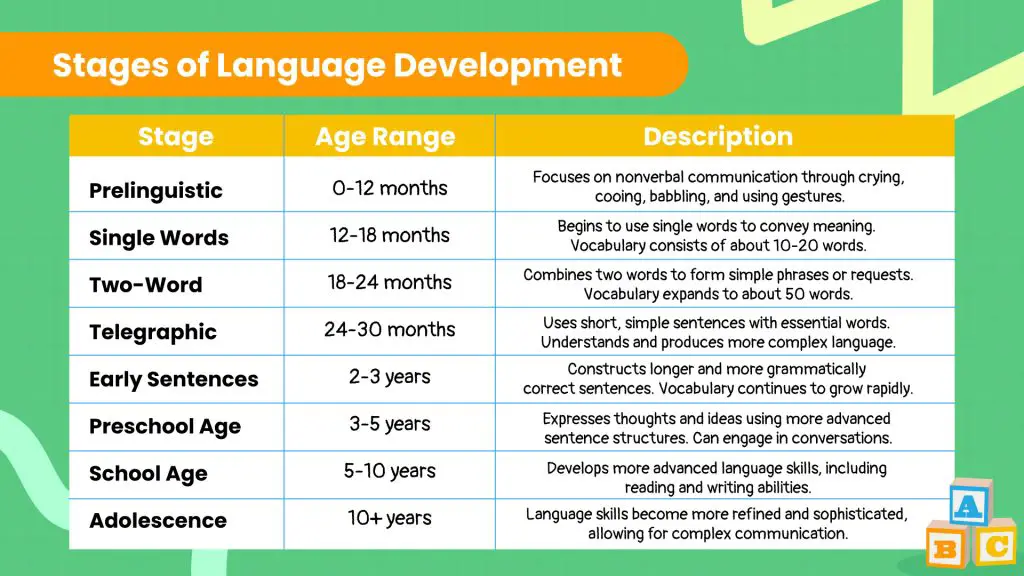We deliver our messages to other people through proper communication.
That is how we receive their thoughts, too.
This requires basic to complex comprehension of the human language, which is not very evident to young people.
In that case, how can we communicate and understand our children at the early stages of their lives?
The telegraphic stage of language development provides us with helpful insights into this.
Telegraphic Stage of Language Development
The telegraphic stage of language development is a person’s ability to utter phrases to communicate.
The average speech pattern involves proper construction of grammar and comprehensive use of vocabulary.
On the other hand, the telegraphic stage only requires the use of necessary words such as nouns, verbs, or adjectives.
Often, this means that telegraphic speech does not include prefixes, suffixes, prepositions, conjunctions, or pronouns.
In simpler words, telegraphic speech can be described as two-word sentences.

At What Age Does a Child Learn Telegraphic Speech?
Generally, children begin using telegraphic speech between 18 to 24 months of age.
Nonetheless, some early birds or children who are more advanced in speech development may begin at 16 months.
However, these phrases almost always contain two words only.
By the time the child reaches 24 to 30 months old, they will further improve the use of telegraphic speech and transition to three-word phrases or even complete sentences.
Additionally, it’s important to note that your child’s gender may also affect their speech development progress.
That’s because, with 16-month-old children, girls tend to have a wider vocabulary at 95 words than boys, which is at 25 words.
If you’re worried about your kid having a speech disorder, it might help to learn more about these conditions by reading Language Disorders from Infancy Through Adolescence.
The Importance of Telegraphic Speech
The telegraphic stage is a significant milestone in every toddler’s life.
It’s the first step towards advanced communication, and it helps your child in multiple ways.
Emotional Communication
When your child was still a baby, you probably felt a little frustrated when they kept crying and you didn’t know what they needed.
Imagine how much harder it is for them not to be able to specify what they’re feeling.
The telegraphic stage bridges this gap by associating emotions with words and combining two separate meanings to create one thought.
This huge development allows your toddler to say things like, “I hungry” or “Daddy fix.”
Preparatory Stage of Sentence Construction
The most crucial part of sentence construction is the proper arrangement of essential words.
In the telegraphic stage, your child learns this vital part of speech.
They begin to use nouns before verbs or adjectives, which is a prerequisite to properly constructing a sentence.
Grammar Development
Building upon what we’ve just talked about, telegraphic speech is a stepping stone towards grammar development.
By mastering how to form phrases with necessary words, your child will eventually learn how to fill in the blanks.
After a few months or a year, he will start adding words to his phrases to make a more comprehensive sentence.

How To Encourage Telegraphic Speech?
With telegraphic speech being a vital part of language development, our job as parents is to encourage our toddlers to keep using and exercising it.
There are multiple ways for us to do this, and the steps below should be very helpful.
Correct Language Modeling
As parents, we inevitably become role models for our children, whether we do it knowingly or not.
They mirror almost everything we do, regardless of whether it’s right or wrong because they have little concept of it at such an early age.
As you can imagine, this includes our speech patterns, too.
When your child begins to talk in telegraphic speech, make sure not to use the same when talking to them.
Instead, use the correct language, including proper grammar so that they can model it.
For example, if your child says, “Read book” while reading a book, repeat what they are saying in the correct sentence. Say, “You’re reading the book.”
This will help your child pick up cues on what words should follow or precede the necessary words in their initial phrase or telegraphic speech.
Gestures
Believe it or not, gestures are just as important in speech as the words we say, and this is especially true in the early stages of language development.
Before your child learned to say “eat” or “mama” or “dada,” they started by pointing or gesturing to what they needed.
That’s why it’s also crucial that you use gestures when talking to your child.
For example, when you say “I’m hungry,” you can touch or hold your stomach, as this is where your toddler would most likely feel the physiological need to eat.
By doing so, you provide your child with auditory and visual cues, allowing them to associate emotions with verbal sounds or words.
Activities
At this stage in their lives, children love playing. That’s why you must find ways on how to keep them entertained while learning.
Play is also particularly important in language development.
When children have fun, they will continue engaging in the activity, therefore honing their skills.
To encourage your child’s use of telegraphic speech, you can start by describing what you’re doing.
Make sure that you limit it to a few words so that it’s still comprehensive.
You can also invest in fun and exciting educational products that help develop language, such as this Language Builder Set from Stages Learning.
Additionally, it’s also important that you use proper grammar.
When you’re washing the dishes, folding clothes, or taking a walk, talk to your child and narrate what’s happening around the two of you.
You can also ask your children questions to encourage them to talk.
All of these bouts of communication will eventually develop your child’s speech pattern.
Do Not Force Your Child
A huge part of encouraging your child to speak is not to put too much pressure on them.
Just because your friend’s toddler is progressing at a fast rate doesn’t mean your kid should, too.
Forcing and pressuring your child to speak or repeat what you’re saying may demotivate them.
Because of this, your time and effort will be counterproductive.
Instead of helping develop your child’s telegraphic speech, they may refrain from speaking altogether and be less interested in participating in your activities.
A better approach would be to pause when you’re speaking to your child, as doing so will provide them with enough time to respond.
If they don’t, that’s fine. If they do respond, praise your child to encourage this behavior.
Speech Therapy
If your child hasn’t developed their speech at the age of two or three, make sure that you seek professional help.
If you notice that your child struggles to form sentences or even phrases in telegraphic speech, a speech therapist might be helpful.
These medical professionals assess your child’s current level of language comprehension and lay down multiple speech development techniques to eliminate hindrances.
Seeking a speech therapist may also help you determine whether or not there is an underlying condition that delays your child’s language development.
You can learn more about this from books like Vicki Reed’s Introduction to Children With Language Disorders.
Encourage Telegraphic Speech Positively!
Telegraphic speech is a huge milestone in your child’s language development.
How you respond to it will significantly affect the outcome of your child’s speech, so make sure that you encourage it positively.
On the other hand, don’t think twice about consulting a medical professional if you feel that your child needs it.
As the adage goes, prevention is better than cure.
Addressing your child’s speech condition early on is important in their language development.

